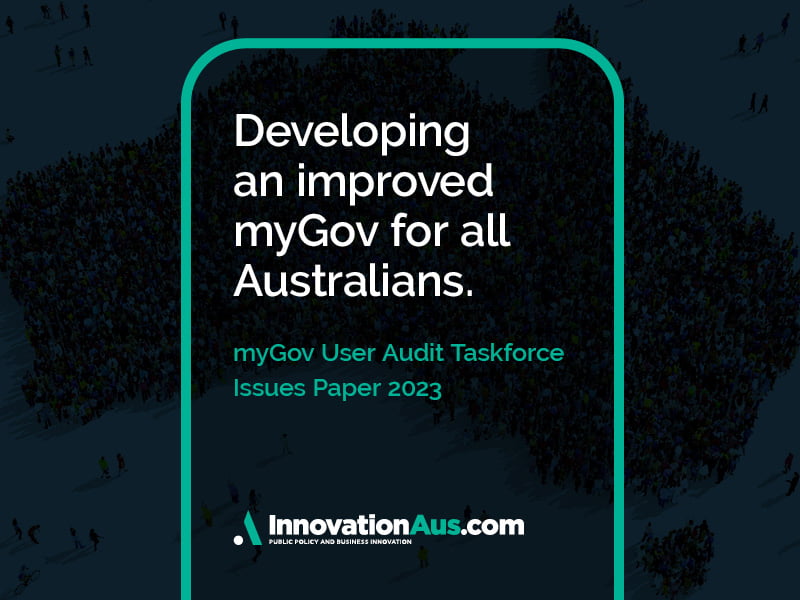The key priority for any future development work on the myGov platform must be on improving accessibility for the people who need government services the most. That means Australians with a disability and those from marginalised communities.
This renewed design focus on fundamental accessibility issues would ultimately result in a better platform and a better user experience for every Australian.
This is the central theme of Developing an improved myGov for all Australians – a myGov User Audit Taskforce Issues Paper 2023 published on Friday.
The paper is based on ideas from a formal roundtable discussion hosted by InnovationAus in Canberra late last year on behalf of the myGov Taskforce.
In addition to addressing accessibility challenges, the issues paper outlines a need to make the platform more efficient and transparent, and the potential for future development work on myGov to benefit local tech and service design businesses.
It was the accessibility issue that set the tone for the discussion. The user experience of myGov has been much maligned, and OKTA principal solutions architect Jefferson Haw said a focus on accessibility would help fix this.
“If you make something that works really well for disabled people, literally everyone prefers it,” Mr Haw said. “All high literacy people prefer texts that are written for low literacy people [for example].”
The sentiment was echoed by Zoe Rose, the principal at Great Question, a Canberra-based UX design and training organisation.
“When you solve for disadvantaged users, you solve for everyone else without putting much more money into it,” Ms Rose said. “When you solve for disadvantaged people, you make it better for everyone.”
Others taking part in the roundtable discussion included Australian National University visiting fellow Glenn Archer, Granicus director of client services Mel Hagedorn, Centre for Digital Business chief executive Marie Johnson, Hireup head of product engineering Cathy Lill, ANU clinical associate professor Louise Stone, and Hyperreal co-founder Cath Thompson. A full list of participants can be found on page three of the issues paper.
The current myGov iteration is seen to be complex and burdensome, the issues paper found, and this is driving people away from using government services, especially those with special needs.
“Their experience is, over and over again, triage and conclusion, and because we know that the bottom quintal has five times as many mental health conditions but five times less services. They get excluded at a rate of knots,” the ANU’s Professor Stone said.
Glenn Archer, a former Australian Government chief information officer, said that the current version of myGov is far more complicated than it should be, and more complicated than it needs to be.
“The government chooses to expose its own complexities, and that’s unnecessary. It just complicates the life of people who don’t feel the need to understand that. It’s just unnecessary,” Mr Archer said.
The paper also identifies a common misconception that simply digitising a government service makes it more accessible.
“It’s a seductive narrative – that it increases access. But it’s like a door without a key; it’s there but you can’t get into it,” Professor Stone said.
The issues paper also identified the opportunity for local small and medium businesses to be brought into the fold and participate in any future iterations of the myGov platform.
Several of the industry experts said that more effort needs to be made to open up the procurement process to involve more Australian SMEs in this process.
“We can’t compete with these major companies which can fulfil 80 to 90 per cent of these contracts. We can collaborate with government, we can build better products at a cheaper price for government, but we can’t compete,” Hyperreal co-founder Cath Thompson said.
The resounding message from the roundtable discussion and the Issues Paper is that the myGov audit can mark the first step in making significant changes to myGov for the benefit of all Australians, and particularly those who need the crucial services it offers the most.
The myGov platform has long been considered the front door to some of the essential services provided by the federal government, even if that front door has struggled to provide an easy to use entry.
As part of an election promise, the Albanese government last year established a new panel to guide a user audit of myGov, tasked with investigating its user experience, functions and performance and role and performance within the wider government services ecosystem.
The panel was led by David Thodey and featured former Human Rights Commissioner Edward Santow, eSafety Commissioner Julie Inman Grant, social epidemiologist Professor Emily Banks and former Uber Head of Global Economy Policy Amit Singh.
The audit was a significant opportunity to reimagine and redesign the myGov platform for the benefit of all Australians, particularly those who need the services it provides access to the most.
The Developing an improved myGov for all Australians Issues Paper is based on a roundtable discussion hosted by InnovationAus in collaboration with the myGov Taskforce in Canberra in November 2022. The roundtable was recorded, refined and structured into the paper, which was published in partnership with the myGov User Audit team.
You can download your copy of the Issues Paper here.
Do you know more? Contact James Riley via Email.

